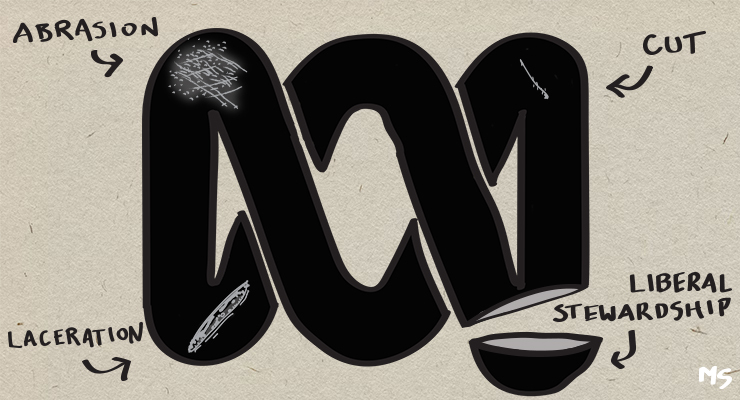
Tension between federal governments and the ABC is inbuilt because the ABC is a statutory authority bound by its charter to provide an independent broadcasting service.
Its editorial policies require it to follow “fundamental journalistic principles of accuracy and impartiality” and reports on Australia and the world “without fear or favour, even when that might be uncomfortable or unpopular”.
This includes the government of the day, whose activities are routinely covered by ABC news and current affairs. This sounds like a statement of the bleeding obvious but is rarely stated — which means most forget or don’t understand what is at stake in government-ABC relations.
The tension surfaces on the government’s side in various overt and covert methods of controlling the public broadcaster, and on the ABC’s side in routine proclamations of independence from government, whether Labor or Liberal. ABC managers and journalists are at pains to say they report without fear or favour and often insist that if government is annoyed by their reporting they must be doing something right.
This is an important half-truth. Every government has been irritated, upset or outraged by the national broadcaster’s journalism, and every government has sought to use the levers at its disposal to persuade at best and punish at worst.
What this half-truth skates over, however, is that the Liberal-National Party Coalition has been substantially more hostile towards the ABC, both in outlook and in action, than Labor.
This has important implications, but they are rarely discussed publicly. It is not really in the major political parties’ interests to do so, nor is it in the ABC’s, nor is it in the media’s. Some sections of the media are unabashedly hostile to the ABC and others couldn’t care less about it.
The upshot is that everyone stays quiet and the public rarely gets a full picture of what is actually going on.
One way of seeing that fuller picture is to compare how different governments have treated the ABC.
The act of Parliament changing the ABC from a commission to a corporation came into effect in July 1983. In the 39 years since, the two major parties have been in power for almost the same period: just under 19 years for Labor (1983-96, and 2007-13), and 19-and-a-half years for the Coalition (1996-07 and 2013 to now). This provides a good basis for such a comparison.
Which governments have increased funding, which have cut it, and by how much?
Analysis of the ABC’s budget is tricky. Nominal funding must be separated from real funding levels. Nominal funding of the ABC has increased from $274 million in 1983-84 to $881 million in 2021-22, but in real terms — that is, adjusted for inflation — funding has actually fallen 4% in that period.
(Transmission costs, which account for about 20% of the ABC’s budget, are unavoidable and for many years were included in a government department’s budget rather than the ABC’s. Hence the difference between $881 million for 2021-22 and the oft-touted $1 billion figure for the ABC’s funding.)
You need to look at operational funding because that is what the ABC needs to produce its programs. The following graph shows the level of ABC funding in real terms ($ millions, 1983-84 dollars) at the end of each of the past five Australian governments.

The Hawke/Keating government’s last budget allocation of $281 million (real) in 1995-96 was 7% higher in real terms than the allocation of the Fraser government in 1982 ($264 million).
The period of the Howard government (1996-07) showed a decline of 5% in real funding, from the $281 million to $268 million (real) in the budget for 2007-08.
Funding increased during the Rudd/Gillard/Rudd government to reach $296 million (real) in 2013-14, an increase of 10% over the term of the government.
The Morrison government’s record shows the steepest decrease in ABC funding, dropping by 11% from 2013-14’s figure of $296 million to $263 million in 2021-22. (2021–22 budget papers show ABC funding declining further to $257 million in real terms in 2022-23. See: 2021–22 Portfolio Budget Statement, accessed July 22, 2021.)
The government’s recent budget announcements hardly alter that trajectory. It has trumpeted the restoration of indexation of ABC funding, but this is only a reversal of a “cut by any other name”, made in 2018, when the ABC lost out on about $84m.
Moreover, the funding increases offered over the next three years are well below growth projections for the Consumer Price Index (CPI). In real terms, then, the ABC is likely to be worse off than it is now.
This is an edited extract from Who Needs the ABC? Why taking it for granted is no longer an option by Matthew Ricketson and Patrick Mullins. Historical analysis of ABC budget figures is by Michael Ward, a former ABC executive who is doing a PhD about the ABC at the University of Sydney.
Should governments just leave the ABC alone? Let us know your thoughts by writing to letters@crikey.com.au. Please include your full name to be considered for publication. We reserve the right to edit for length and clarity.









Thanks for these figures. No surprise that Labor governments have administered less financial punishment than the Coalition. Has Murdoch given up the mission to privatise the ABC & SBS yet?
The evil Murdochs will never rest until they control all media in Australia…
I reckon Murdoch’s relentless attacks on the ABC could be neatly rewarded with a $100 million initial tax bill, paid directly to the ABC.
Plus return the $30M, gifted twice, to report more minority sport – which undertaking they have not fulfilled.
And ABC doesn’t even slag off the Murdoch’s like independent media does.
Moloch finally seems to have succeeded in crippling the Beeb – Bozo has announced the abolition of the licence fee which funded it, independently of government whim.
And how about that? The Beeb has been crippled by the Right through years of white-anting and drip-feed accusations of bias that slowly but surely undermined public trust to the extent that the Tories are now set to destroy the Beeb without a critical mass of opposition.
And what did we, on the other side, do to support these public institutions? Well some of us white-anted them, too, damning them as Western propagandists, discrediting them all as ‘Western Media Groupthinkers’ the moment they reported something we’d rather they didn’t.
https://www.bbc.com/news/60981238
The Coalition hates the ABC because, unlike Australia’s other big media organisations, it is not owned and run by mates.
Aye, the one bit of the MSM where they don’t have an orchestrated control of the narrative.
The Coalition has tried several times though to influence the ABC by their appointments to the Board.
Maurice Newman, Michael Kroger, Ross McLean, Judith Sloan, Leith Boully, Janet Albrechtsen, Ron Brunton, Steven Skala, John Gallagher, Keith Windschuttle, Peter Hurley, Jonathan Shier, Mark Scott . . . and that’s just the Liberal Party stalwarts stuffed into the ABC during the Howard years. It’s a wonder the public broadcaster survived as long as it has.
Without ABC and SBS I have no free to air TV to watch. Well there’s Channel Mash and Channel Seinfeld if I want to go around for the 5th time.
The only downside to ABC in my life was Grade 1. After a year of Sesame Street I went to school thinking that learning would be fun like on SS. I ended up in serious trouble when I refused to stop singing the alphabet. Big bird didn’t do me any favours when it came to teaching me how to survive the authoritarian claustrophobia of state education.
Hands off my Aunty you sick puppies.
Tim Fischer, Nat leader: “ Without the ABC rural Australia is Siberia.”
Ah yes, friend of Mabo, good old Tim “bucketloads of extinguishment” Fischer, DPM.
The ABC is the victim of right wing paranoia that the objective truth does not support right wing propaganda.
I think the ABC is one sided – not as one sided as NewsCorp but one-sided nevertheless. On any topic, you can pick the way it will be presented by the ABC.
The arguement people have made in the comment sections to me is that it’s ok for Crikey and ABC to be a biased against LNP because they are merely counteracting significant bias from Murdoch (etc). That’s Crikeys choice to make, but this arguement doesn’t cut it when it comes to the national broadcaster and their use of public funds.
The ABC uses public funds to tell the truth. That’s all. That’s the bias.
The problem with the ABC is that their journalists will present an opinion and then proceed to prove it with a series of carefully selected supporting opinions, and make no effort what so ever to present the logic of the opposing view point (let alone provide opposing opinions), so that the reader can decide for themselves.